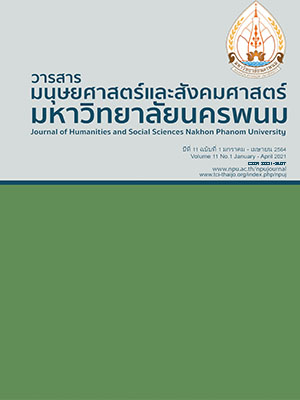Cultural Management for Existence of Thai-Phuan Folk Plays : A Case Study Nakhon Nayok Province and Saraburi Province
Main Article Content
Abstract
The objective of this research was to study the cultural Management for the Existence of Thai- Phuan Folk Plays : a case study Nakhon Nayok Province and Saraburi Province by using qualitative research methods collecting data from 3 sources. 1) document sources 2) human sources- using an individual in depth interview of 65 main key informants 3) in the field data source by participatory observation. The research tool used was a semi structured interview form. All 3 sources were synthesized and presented in descriptive data.
The results of the research showed that Nakhon Nayok Province is a province with high social capital, while Saraburi province has a complete cultural capital. Therefore the cultural management model for the existence of the Thai folk plays of these two provinces in the beginning is different, but the process was the same. An overview of cultural management processes can be seen in 4 areas, 1) management for reviving culture 2) management for cultural inheritance 3) management for applied adjustment 4) management for promotion and dissemination. The key to the successful cultural management of the Thai folk plays of both provinces is the cooperation of the people in the culture, and the cultural network that pushes and strongly encourages for the existence of Thai folk plays.
Article Details
References
Kaewthep, K. (2006). Pathombothǣngʻongkhwāmrū Rư̄angsư̄phư̄nbānsư̄sānsuk. Nonthaburi : Sue Poen Ban Sue San Suk project.
Kaewthep, K. (2009). Kānwikhro̜sư̄ : Nǣokhitlæthēknik (4th ed.). Bangkok : Chulalongkorn University.
Lainumngern, W., Punsuae, W. (2018, January - June). Kānsưksādontrīnaiphithīkamnāngdongkhō̜ngchāothaiphūanbānko̜wāi ʻAmphœ̄pākphlī Čhangwatnakornnāyok. A study of music in Nang Dong rituals of Thai Puan ethnic group in Ban Kaowai , Pakpli district, Nakhonnayok province,” Journal of fine arts research and applied arts. VOL 5 (1) ; pp. 293 – 312.
Lawan, S., Muangkeow, K., Weravitayanan, T., Netpongtham, P. (2017). Nāngdongnāngkhwāi. Nangdong-NangkwayThe 4th Kamphaeng Phet Rajabhat University National Conference (pp. 115-122). Kamphaeng Phet : Kamphaeng Phet Rajabhat University.
Plagwong, K. (2011). Lamphawon : Kranīsưksāphūmpanyāthō̜ngthinchāophūan Tambonbānsāi ʻAmphœ̄bānmī Čhangwatlopburi. Lum Puan : A case study of Puan folk lores, Bansary subdistrict, Banmee district , Lopburi province. Master of fine arts degree in Ethnomusicology. Bangkok : Srinakharinwirot University.
Pongkittiwiboon, S. (2012). Kānsamrūatsathānaphāplækānsư̄pthō̜tsư̄kānsadǣngphư̄nbānnaiphāktawanʻō̜k.
The status and inheritance of folk media in the east of Thailand Chonburi : Burapha University.
Santawee, K. (2009). Lamphawon : Kānwikhro̜kānsư̄sānkapkānsư̄pthō̜tʻatlakchāothaiphūan ʻAmphœ̄bānmī Čhangwatlopburi. Lam Phuan : Communication and the reproduction of Thai Phuan identity in Bann – mi, Lopburi. Master of arts program in Mass Communication. Bangkok : Thammasat University.
Wanwichai, R. (2016, January - June). Sưksākānbō̜rihānčhatkānthāngwatthanatham Kranīsưksāngānsinlapakānsadǣngphư̄nbān Čhangwatʻutdit. Cultural Management : A Case Study of Thai Folk Performances in Uttaradit Province. Journal of Cultural Approach. VOL 17 (31) ; pp. 18- 30.


